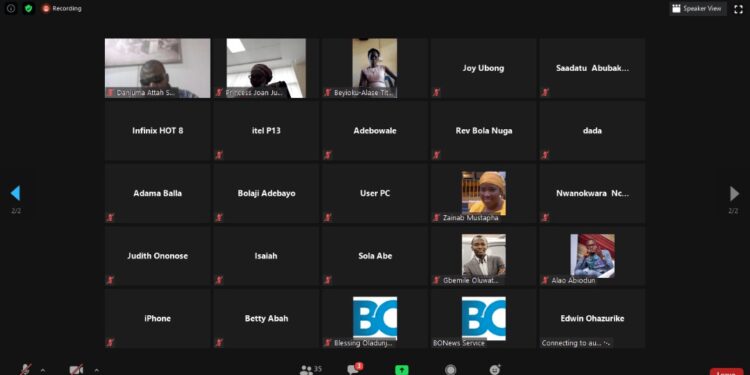BONews Service, an online development news platform and FACICP Disability Plus have urged the Nigerian government to review its strategies in the planning of COVID-19 intervention such that the needs of Women with Disabilities are highlighted and met
The call was made during a one-day online National Policy Dialogue that was organised by BONews Service in collaboration with FACICP Disability Plus, themed “Improving the responsiveness of COVID-19 Interventions in Health, Humanitarian and Gender Sectors in Nigeria to the needs of Women with Disabilities”
While speaking at the event, Blessing Oladunjoye, Publisher BONews service explained that the aim of the policy dialogue was to create an avenue for women with disabilities to present their issues to relevant agencies of government for proper action to be put in place.
Talking about the project which was supported by Urgent Action Fund, Oladunjoye noted that “It was observed that disability-inclusion is grossly lacking in all COVID-19 intervention programs of the Nigerian government thus far, from the communication strategies including public enlightenment tools both on and off the media; COVID-19 treatment programs; use of public health infrastructure; to the distribution of food relief and other social support interventions.
“The project was initiated as a result of requests and agitations by persons with disabilities that all the various COVID-19 interventions in Nigeria need to be disability-inclusive.
“Therefore, this project is designed to address the awareness and capacity gaps among WWDs on current and emerging COVID-19 issues. This is quite important because of the level of vulnerability of WWDs to contracting the virus due to their peculiar physiological and social conditions.”
On her part, Sola Abe, a journalist and young leader, Women Deliver gave the overview of the FACICP COVID19 online situation room for women with disabilities which was the crux of the position papers presented at the event.
She stated that “the online situation room, was set up in April, 2020 to collect information on the experiences of WWDs with regards the various COVID19 interventions at local, state and national levels. The online situation room was to serve as a virtual safe space for WWDs to interact, share ideas, seek and get counselling and other support, and to reflect on issues and challenges confronting WWDs in general”
The Position Paper to the humanitarian issues was delivered to the Ministry of Humanitarian Affairs, Disaster Management and Social Development by Dr Adebukola Adebayo, a disability and inclusive development consultant and CEO HORDC
Dr Adebayo noted that the online situation room that was set up by FACICP Disability Plus revealed three major issues that affected WWDs during the lockdown which centred around humanitarian, health and gender.
He said “People with disabilities are more vulnerable when emergencies happen. Evidence is clear if we look at the situations in the North-East and other parts of the country where emergencies occur.
“Women with disabilities are more excluded in humanitarian intervention and the majority of the women did not get palliative or support in terms of services and access to mobility aid from the government because this was not put into consideration.
He thereafter called on the Ministry of Humanitarian Affairs Disaster Management and Social Development to review its strategies in the planning of COVID-19 intervention such that the needs of WWDs will be highlighted.
Similarly, the Executive Director FACICP Disability Plus, Ms Ekaete Judith Umoh presented the Position Paper on gender and health to the Ministries of Women Affairs and Health respectively.
Ms Umoh noted that “11%of WWDs were victims of direct domestic abuses such as sexual and psychological abuse during the lockdown.”
“25%of WWDs experienced violent physical abuse. Nearly 20% of WWDs reported being subjected to domestic neglect during the lockdown.”
She added that “among the WWDs who reported being victims of one form of abuse or the other, 35 per cent affirmed that the lockdown was a major cause of the abuses they suffered.”
Speaking on health issues and WWDs, Executive Director FACICP Disability Plus stated that
PWDs, especially WWDs, in view of their high level of socio-economic vulnerability and their very limited access to health services are identified as among the most vulnerable to COVID19 health challenges.
“Throughout the lockdown period nearly 80% of WWDs had no access to general health services from public health facilities,” she said.
Specifically, 70% of WWDs who responded to the Situation Room indicated that they had no access to SRH services.
She called on the Ministry of Women Affairs and the Ministry of Health to create strategic plans for engaging WWDs and to review its COVID-19 interventions to ensure that WWDs are able to participate and benefit in the design, planning, implementation and monitoring of interventions.”
In response to the issues raised, the Minister of Humanitarian Affairs, Disaster Management and Social Development, Sadiya Umar Farouk who was ably represented by Hon. Danjuma Attah, said “we have set up COVID-19 committees which would include WWDs to enable us to proffer solutions that are disability-inclusive.
In a similar vein, the Minister for Women Affairs, Dame Pauline Tallen, who was represented by Princess Joan Jummai Idonije, said “the Issue of WWDs is topmost of the ministry’s agenda. We are hoping to put in place a strategic document that would be used in women-owned businesses including WWDs.”


Comments 1